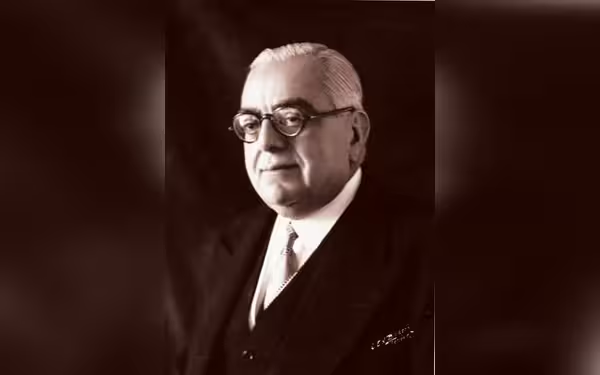Saturday, November 16, 2024 09:35 PM
Sir Sultan Muhammad Shah Aga Khan III: A Pillar of the Pakistan Movement
- Aga Khan III advocated for Muslim rights and education.
- He founded Aligarh Muslim University for higher learning.
- His legacy continues through Prince Karim Aga Khan.
 Image Credits: nation_pk
Image Credits: nation_pkCommemorating Sir Sultan Muhammad Shah Aga Khan III's pivotal role in the Pakistan Movement and his enduring legacy in education and Muslim rights.
KARACHI - November 2 marks the 147th Birth Anniversary of Sir Sultan Muhammad Shah Aga Khan III, a prominent Muslim leader who played a vital role in the Pakistan Movement. Born on November 2, 1877, to Aga Shah Ali Shah, a respected religious figure, Sir Aga Khan became the 49th spiritual leader of the Ismaili sect at the tender age of seven after his father's passing. His early exposure to leadership and his father's legacy inspired him to advocate for the rights and welfare of Muslims in the Subcontinent.
Sir Sultan Muhammad Shah Aga Khan was not just a spiritual leader; he was a dynamic political figure who understood the importance of education and unity among Muslims. His political journey began when he joined the Imperial Legislative Council at the age of 25. He was instrumental in raising political awareness among Muslims, leading the Simla deputation, and later forming the All India Muslim League, where he was unanimously appointed as its first president. His foresight allowed him to identify the challenges faced by Muslims, particularly the dominance of Hindus in the Subcontinent.
Believing that education was the key to empowerment, he took significant steps to establish Aligarh Muslim University, serving as its first Chancellor. In a speech at the Muslims Educational Conference in 1904, he emphasized the need for a university that combined high academic standards with moral education. He stated, "The far-sighted among the Muslims of India desire a university where the standard of learning should be the highest and where alongside scientific training there shall be moral education, that serves as the constant reminder of the eternal difference between right and wrong, which is the soul of education." This vision laid the groundwork for future generations of Muslim scholars.
In 1911, Sir Aga Khan was appointed Chairman of the Funds Collection Committee, where he took the initiative to raise funds for the university. His commitment was evident when he personally donated Rs 100,000 and led efforts to gather support from various cities across India. His political acumen was recognized internationally, leading to his election as President of the League of Nations, where he advocated for the rights of Muslim women and their education.
After the independence of Pakistan, Sir Sultan Muhammad Shah proposed that Arabic be made the national language, believing it would strengthen ties with other Muslim countries. During a time of crisis, he played a crucial role in securing Gwadar port for Pakistan, demonstrating his unwavering commitment to the nation. He passed away on July 11, 1957, but his legacy continues through his grandson, Prince Karim Aga Khan, who actively supports Muslim communities in Pakistan, Afghanistan, Bangladesh, and Indonesia.
Sir Sultan Muhammad Shah Aga Khan III's contributions to the Pakistan Movement and the empowerment of Muslims in the Subcontinent are invaluable. His vision for education, unity, and political awareness remains relevant today, reminding us of the importance of leadership that prioritizes the welfare of the community. As we commemorate his birth anniversary, it is essential to reflect on his teachings and strive to uphold the values he championed for a better future.













